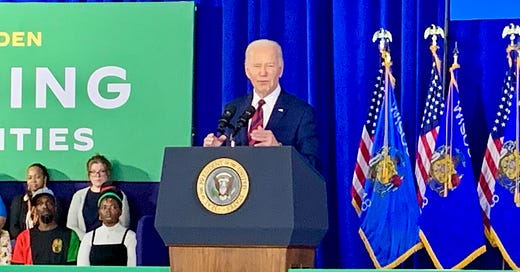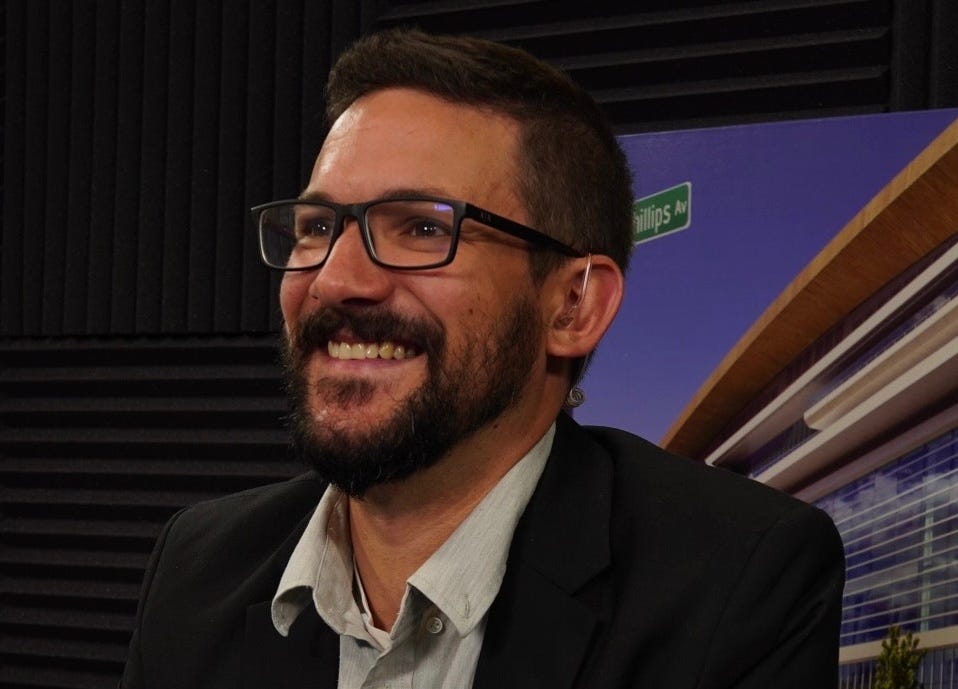In Milwaukee visit, President Biden aims to right wrongs of the past with new infrastructure investment
The president announced a more than $35 million investment to rebuild 6th Street in Milwaukee, as part of an expanded $3.3 billion effort to reconnect communities across the country.
The Recombobulation Area is a ten-time THIRTEEN-TIME Milwaukee Press Club award-winning weekly opinion column and online publication written, edited and published by longtime Milwaukee journalist Dan Shafer. Learn more about it here.

During his visit to Milwaukee, President Joe Biden made a significant announcement about rebuilding a city street.
But this announcement — nearly $40 million for the 6th Street Complete Streets Project — is not only the type of infrastructure investment that the Biden administration has been making many of since passing the Bipartisan Infrastructure Law in 2021, but it is part of an effort to right wrongs of the past, wrongs that saw transportation projects divide and disrupt urban communities, oftentimes in diverse neighborhoods.
“Instead of connecting communities, they divided them.” Biden said on stage at the Pieper-Hillside Boys & Girls Club in Milwaukee. “These highways actually tore them apart.”
Milwaukee’s history with highway expansions and the “urban renewal” programs in the 1960’s is certainly part of this story, as those projects displaced thousands of Black-owned homes and businesses, particularly along Walnut Street in the city’s Bronzeville neighborhood, just blocks from where Biden was speaking.
“The construction of I-94 and I-43 tore down roughly 17,000 homes and 1,000 businesses, ripping through neighborhoods and nearby roads,” said Biden, during his roughly 20-minute speech. “Here on 6th Street, the road was widened, taking space from residents and business, all so that people outside the neighborhood could get downtown.”
He added, “Today, we’re recognizing that history to make new history.”
The announcement for 6th Street is part of the Biden administration’s expanded “Reconnecting Communities” grant program that was part of the Bipartisan Infrastructure Law and the Inflation Reduction Act. This new investment for Milwaukee is just one small part of a $3.3 billion nationwide effort to “reconnect and rebuild communities in more than 40 states, including those that were divided by transportation infrastructure decades ago and have long been overlooked.” In this roughly 2.5-mile stretch of road, this project is set to include new wider sidewalks, a protected bike lane, dedicated bus lane, and other green infrastructure.
This project and this initiative is very much a step in the right direction. Milwaukee absolutely needs more investments in newer, redesigned “complete streets,” and this is a perfect place to transform a road that stretches through different neighborhoods into one that allows for better access and connections in this critical part of the city.
It bolsters the noble larger mission of righting wrongs of the past while reinventing a better future in our built infrastructure. It also fits right within the goals of the urbanist reinvention taking place in the city of Milwaukee. Both County Executive David Crowley and Mayor Cavalier Johnson spoke at the event in support of the president and the work his administration has done for Milwaukee, and this project is among several identified in the Department of City Development’s “Connec+ingMKE Downtown Plan” as one of several “catalytic projects.”
See more photos of the event by following @therecombobulationarea on Instagram.
“Milwaukee County deserves roadways that connect our people, business and neighborhoods — not divide them,” said Crowley.
Along with Crowley and Johnson, Rep. Gwen Moore and Gov. Tony Evers also spoke at the event. Moore told a brief story about growing up in a nearby neighborhood, walking to church from her home.
“I can’t do that now,” she said, because of the nearby freeway “and the destruction of our community, our sense of community, and being together. All of that is going to change with this announcement today.”

Perhaps the most interesting story shared on the stage, though, was from Ray Hill, executive director of the Historic King Drive Business Improvement District. Hill discussed her family’s history in Milwaukee and nearby neighborhoods. She talked about her grandfather, Lawrence Hill, a veteran who opened a restaurant on Walnut Street, only for it to be demolished as 6th Street was widened in the 1960’s.
“Because of this Reconnecting Communities and neighborhoods grant made possible by the President’s agenda, a vibrant 6th Street is on the return,” she said, in a speech introducing the president. “Projects like complete 6th Street transcend infrastructure. They are commitments to the community, to safety, mobility and quality — especially for the neighborhoods that were burned by historical disinvestment and the freeway expansion. Seventy-five years later, if my grandfather was alive, he would be proud.”
As the president said, these decisions of the past “still reverberate today.”
“Imagine all those homes and mom and pop stores that could have been passed down from family to family —- financial security, generational wealth,” he said. “Imagine what they could have contributed all these years, and what that would have meant for Milwaukee and communities (like it) across the country.”
After the president’s speech, I had a chance to speak further with Hill, who expanded on her story.
“My grandfather was in the Navy, and borrowed $300 to open a diner in 1949,” she said. “It was one of the best places to get burgers and frozen custard, and he held onto that for about 20 years. Until “urban renewal.” So, Walnut Street, widened; 6th Street, widened. And so he was forced to relocate to 12th Street, where he renamed the restaurant and had to start completely over. It really took a toll because my grandparents had to sell their first home to reinvest into the new restaurant. It caused some issues with my grandmother who ended up going to the hospital, just because she couldn’t handle it. So, my grandfather actually raised my mom and my mom was the youngest of six. It really (had a lasting) impact.”
Hill supports this project and has positive things to say about other projects happening around Milwaukee.
“I really appreciate the rethinking that the urban planners are doing, specifically around walkability, just to make streets accessible again for people to walk and cycle and not be in cars,” she said. “We’re a car-heavy city here in Milwaukee, so the ability to get out of the car and actually be able to walk and connect with people is important. It’s undoing some of the things that were done to cause division that was racially motivated. It’s great to right the wrongs.”
She also said it’s important to think about Milwaukee as a “future-forward thinking” city, in line with Mayor Johnson’s goal to grow the city to one million people.
“The only way you’re going to be able to do that is to really foster that connection and redo some of the things that were done wrong,specifically around people who have been disadvantaged. I’m really excited to see what comes of it. I think the city is going to be different in the next couple years, for sure.”
Projects like what’s going to happen on 6th Street are genuinely encouraging. So many infrastructure projects happening throughout the city are set to transform Milwaukee for the better. Help like this from the federal government can go a long way toward advancing these goals. This stretch of 6th Street from North to National is going to be better for the city and its residents.
But as the Biden administration reorients the focus of the nation’s transportation infrastructure in this bold new direction, not everything is going to have progress demonstrated all at once. Just this past week, the Federal Highway Administration approved the Wisconsin Department of Transportation’s plan to widen I-94 in the city of Milwaukee, a project that — surprise! — is now projected to cost $500 million more than previous estimates. Progress is not always linear, and while the 6th Street Complete Streets Project is a good thing that the Biden administration and local leaders should be commended for, this week’s news is a reminder that the legacy of freeway expansion in diverse communities is not a relic of the past, but something still happening in the present.
But one street at a time, things are changing. This remarkable investment in rebuilding 6th Street for a better future in Milwaukee is real, concrete evidence of that, and is something President Biden and his administration can truly say will have a lasting impact. That’s a very good thing.
Dan Shafer is a journalist from Milwaukee who writes and publishes The Recombobulation Area. He’s also written for The New York Times, The Daily Beast, Heartland Signal, Belt Magazine, WisPolitics, and Milwaukee Record. He previously worked at Seattle Magazine, Seattle Business Magazine, the Milwaukee Business Journal, Milwaukee Magazine, and BizTimes Milwaukee. He’s won 17 Milwaukee Press Club Excellence in Journalism Awards. He’s on Twitter at @DanRShafer.
Subscribe to The Recombobulation newsletter here and follow us on Facebook and Instagram at @therecombobulationarea.
Already subscribe? Get a gift subscription for a friend!
Want to subscribe with a group? Get a group subscription for 30% off!
Follow Dan Shafer on Twitter at @DanRShafer.









"rebuilding 6th Street for a better future in Milwaukee is real, concrete evidence"... Groan.